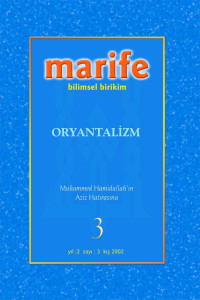Abstract
The fundamental theoretical basis of classical orientalistic discourse can be
traced back to the Western positivist social theories which describe the ‘East’ or the
‘other’ as an irrational. And it idealizes the ‘West’ as a rational one. This generalizing
and subjective approach which is the dominant characteristic of the positivistic
social theory had an influence on the classical orientalistic approach to Islamic law.
This article tries to critisize this orientalistic approach which is impressed by above
mentioned theoretical perspective to the nature of Islamic law by taking N. J. Coulson
as a representative figure. In line with his orientalist predecessors he characterises
Islamic law with some conflicts and tensions. Such as conflicts and tensions between
revelation and reason, change and stabilitiy and idealism and realism etc.
This west-oriented subjective orientalistic approach constructed an Islamic law
imagination which has an idealistic nature. Accordingly in it’s historical process it
never adapted itself –after it’s formation period- to the social changes. In this article,
these orientalistic arguments which do not appropriate with the historical reality
of Islamic law will be critisized.
Abstract
......................................................................................................................................................................................................................................................
Details
| Primary Language | Turkish |
|---|---|
| Subjects | Religion, Society and Culture Studies |
| Other ID | JA56JH49SB |
| Journal Section | Research Article |
| Authors | |
| Publication Date | December 31, 2002 |
| Acceptance Date | December 8, 2002 |
| Published in Issue | Year 2002 Volume: 2 Issue: 3 |
This work is licensed under a Creative Commons Attribution-NonCommercial 4.0 International License.

